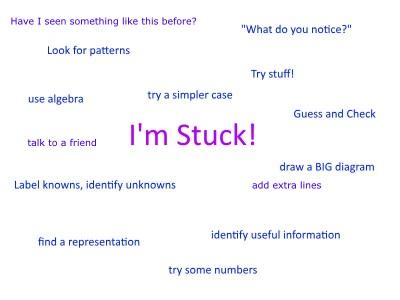2018 BCME secondary workshop
Using NRICH tasks to develop resilient problem solvers
With the new national curriculum, GCSE and A levels, and the demand from universities and employers for resourceful and independent problem solvers, developing our students' problem solving skills is more important than ever.
In this workshop for secondary teachers, we will draw on NRICH's 21 years of experience
(nrich.maths.org), share some new resources, and consider teaching strategies that allow us to embed problem solving into a busy curriculum.
Alison and Charlie have been thinking a lot about resilience since attending a symposium led by Clare Lee and Sue Johnston-Wilder. This led to a presentation at the 2017 Mathematical Resilience Conference, where we began to explore ways of scaffolding NRICH resources. Our Being Resilient collection emerged from the discussions that followed.
Clare and Sue have since contributed an article to our Spring 2018 NRICH Secondary feature Resilience and the Growth Zone.

We began our session at BCME by inviting delegates to have a go at questions on worksheets from two of our Short Problem Collections:
Factors, Multiples and Primes
Angles, Polygons and Geometrical Proof
We then collected together everyone's different strategies from when they got stuck, and made a "I'm Stuck!" poster.
Here are three problems which first appeared on NRICH many years ago, which have now been revisited. We explored the three problems without scaffolding first, and then looked at the new versions for each:
Counting Factors
Iff (including Iff Proof Sorter Interactive and Iff Proof Sorter Converse Interactive)
Areas and Ratios
We discussed ways of scaffolding tasks to bring them within reach of "our" students without doing all the work for them. Here are some examples:
Showing a potential map or route through the problem
Latin Numbers
Showing the start of some methods and inviting students to complete them
Odds, Evens and More Evens
A variety of methods (algebraic/geometric) and follow-up questions
Quadratic Patterns
A proof sorting activity
Pythagoras Perimeters
Showing different methods and inviting students to adapt them in order to generalise
Marbles in a Box
Finally we discussed the following:
What did it feel like to do a problem with the scaffolding?
Did you feel a sense of achievement? Did the scaffolding take the fun away?
Low-achieving students deserve the chance to work mathematically - being a mathematician should be an experience everyone can have. What might we need to do differently to enable them to do so?
Useful links:
Short problems for Starters, Homework and Assessment
These problems are ideal for consolidating and assessing subject knowledge, mathematical thinking and problem-solving skills.
Links to NRICH resources to support Secondary teachers:
- Secondary Curriculum Mapping
- What we think and why we think it
- Enriching the Secondary Curriculum
- Posters for the classroom.
